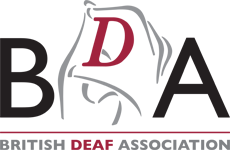Charlene Dolan from the BDA Scotland team got the change to chat to Rachel O’Neill about her role as Programme Director, MSc Inclusive Education at the University of Edinburgh.
In this interesting interview, Rachel talks about her focus as a researcher in deaf education, providing post qualifying education for teachers of deaf children, and being programme director for the wider MSc Inclusive Education programme.
You can watch the full interview above or read a transcript of the video below.
Summary of the content of a conversation between Charlene Dolan of BDA Scotland with Rachel O'Neill, Programme Director, M.Sc. Inclusive Education, from the University of Edinburgh.
Rachel explained that her primary involvement was Deaf education and that students on the M.Sc. course will have worked as teachers for five years before coming onto the course. Councils pay their fees and cover their work while they undertake a mix of University classes and online study.
There are six modules which students must take:
- Inclusive education
- Audiology
- Deaf Studies
- Language and communication
- Adapting the Classroom to suit the Deaf child
- Research Methodology
Placements are an important part of the course. This comprises a four-week placement of observation and mentoring at their own school as well as a three-week placement at a different school - with a different age group or children who use a different mode of communication. Both placements are supported by colleagues and experienced, qualified Teachers of the Deaf.
Reviews and feedback help to improve the course but one improvement Rachel would like to see is that teachers can come onto the course after two, rather than five, years of teaching. Research shows that 30% of teachers in Scotland are working with 9% of Deaf children who sign. However, only 12% of teachers have Level 3 BSL or above. This is impacting on Deaf children who often have greater BSL skills and early intervention with good signing skills is important.
The BSL National Plan will play an important part in improving teachers' skills in BSL. Every child is important as is their method of communication but Rachel believes although the course is successful for those working with children who speak and for some Deaf children who sign, there are children who need their teachers to sign to a higher standard. Rachel believes it's the government's role to lead the way.
Charlene and Rachel joked that her job was not easy. Rachel described it as an ongoing project with many challenges. When asked about new courses, Rachel said she had been asked by Moray House School of Education to investigate the possibility of establishing a four year degree course for people wishing to become teachers at primary school level and who could already sign at Level 3 or above. Interviews would be conducted in BSL.
Moray House already has a successful four year degree course that's delivered in Gaelic so Rachel is looking at whether they could run a parallel course in BSL. There could be shared lectures and workshops would be signed. The potential is there for the course to be open to Deaf and hearing applicants who must be able to sign. It would mean that, by the end of the course, graduates would be able to teach BSL as a modern language to Deaf and hearing children, or, could teach Deaf children at primary level in BSL.
Rachel stressed this was work in progress and that it would mean her relinquishing her duties as Programme Director in order to concentrate on this new development which was important. It would be an exciting development because the field needs more young Deaf people who can sign well and, although the numbers of Deaf children who signed were small, they need specialist support and that means having the right staff.
Charlene thanked Rachel for coming to chat about her work.


